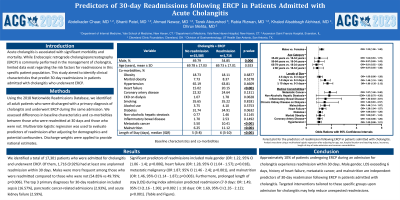Tuesday Poster Session
Category: Interventional Endoscopy
P3696 - Predictors of 30-Day Readmissions Following ERCP in Patients Admitted with Acute Cholangitis
Tuesday, October 24, 2023
10:30 AM - 4:00 PM PT
Location: Exhibit Hall


Abdelkader Chaar, MD
Yale University School of Medicine
New Haven, Connecticut
Presenting Author(s)
AbdelKader Chaar, MD1, Shanti Patel, MD1, Ahmad Nawaz, MD1, Tarek Aboursheid, MD2, Rabia Rizwan, MD1, Khaled Alsabbagh Alchirazi, MD3, Dhruv Mehta, MD4
1Yale University School of Medicine, New Haven, CT; 2Ascension Saint Francis Hospital, Chicago, IL; 3Cleveland Clinic, Cleveland, OH; 4UT Health San Antonio, San Antonio, TX
Introduction: Acute cholangitis is associated with significant morbidity and mortality. While Endoscopic retrograde cholangiopancreatography (ERCP) is commonly performed in the management of cholangitis, limited data exist regarding the risk factors for readmissions in this specific patient population. This study aimed to identify clinical characteristics that predict 30-day readmissions in patients admitted with cholangitis who underwent ERCP.
Methods: Using the 2018 Nationwide Readmissions Database, we identified all adult patients who were discharged with a primary diagnosis of cholangitis and underwent ERCP during the same admission. We assessed differences in baseline characteristics and co-morbidities between those who were readmitted at 30 days and those who were not. Multivariate logistic regression was used to evaluate predictors of readmission after adjusting for demographics and potential confounders. Discharge weights were applied to provide national estimates.
Results: We identified a total of 17,301 patients who were admitted for cholangitis and underwent ERCP. Of them, 1,716 (9.92%) had at least one unplanned readmission within 30 days. Males were more frequent among those who were readmitted compared to those who were not (54.85% vs 49.79%; p=0.006) The top 3 primary diagnoses for 30-day readmission included sepsis (16.57%), pancreatic cancer-related admissions (2.93%), and acute kidney failure (2.59%). Significant predictors of readmissions included male gender (OR: 1.22, 95% CI (1.06 - 1.4); p=0.006), heart failure (OR: 1.28, 95% CI (1.04 - 1.57); p< 0.018), metastatic malignancy (OR 1.87; 95% CI (1.46 - 2.4); p< 0.001), and malnutrition (OR: 1.46, 95% CI (1.14 - 1.87); p=0.003). Furthermore, prolonged length of stay (LOS) during index admission predicted readmission (7-9 days: OR: 1.49, 95% CI (1.16 - 1.90); p=0.002 | ≥ 10 days: OR: 1.69, 95% CI (1.35 - 2.12); p< 0.001). (Table 1 and Figure 1).
Discussion: Approximately 10% of patients undergoing ERCP during an admission for cholangitis experience readmission within 30 days. Male gender, LOS exceeding 6 days, history of heart failure, metastatic cancer, and malnutrition are independent predictors of 30-day readmission following ERCP in patients admitted with cholangitis. Targeted interventions tailored to these specific groups upon admission for cholangitis may help reduce unexpected readmissions.

Disclosures:
AbdelKader Chaar, MD1, Shanti Patel, MD1, Ahmad Nawaz, MD1, Tarek Aboursheid, MD2, Rabia Rizwan, MD1, Khaled Alsabbagh Alchirazi, MD3, Dhruv Mehta, MD4. P3696 - Predictors of 30-Day Readmissions Following ERCP in Patients Admitted with Acute Cholangitis, ACG 2023 Annual Scientific Meeting Abstracts. Vancouver, BC, Canada: American College of Gastroenterology.
1Yale University School of Medicine, New Haven, CT; 2Ascension Saint Francis Hospital, Chicago, IL; 3Cleveland Clinic, Cleveland, OH; 4UT Health San Antonio, San Antonio, TX
Introduction: Acute cholangitis is associated with significant morbidity and mortality. While Endoscopic retrograde cholangiopancreatography (ERCP) is commonly performed in the management of cholangitis, limited data exist regarding the risk factors for readmissions in this specific patient population. This study aimed to identify clinical characteristics that predict 30-day readmissions in patients admitted with cholangitis who underwent ERCP.
Methods: Using the 2018 Nationwide Readmissions Database, we identified all adult patients who were discharged with a primary diagnosis of cholangitis and underwent ERCP during the same admission. We assessed differences in baseline characteristics and co-morbidities between those who were readmitted at 30 days and those who were not. Multivariate logistic regression was used to evaluate predictors of readmission after adjusting for demographics and potential confounders. Discharge weights were applied to provide national estimates.
Results: We identified a total of 17,301 patients who were admitted for cholangitis and underwent ERCP. Of them, 1,716 (9.92%) had at least one unplanned readmission within 30 days. Males were more frequent among those who were readmitted compared to those who were not (54.85% vs 49.79%; p=0.006) The top 3 primary diagnoses for 30-day readmission included sepsis (16.57%), pancreatic cancer-related admissions (2.93%), and acute kidney failure (2.59%). Significant predictors of readmissions included male gender (OR: 1.22, 95% CI (1.06 - 1.4); p=0.006), heart failure (OR: 1.28, 95% CI (1.04 - 1.57); p< 0.018), metastatic malignancy (OR 1.87; 95% CI (1.46 - 2.4); p< 0.001), and malnutrition (OR: 1.46, 95% CI (1.14 - 1.87); p=0.003). Furthermore, prolonged length of stay (LOS) during index admission predicted readmission (7-9 days: OR: 1.49, 95% CI (1.16 - 1.90); p=0.002 | ≥ 10 days: OR: 1.69, 95% CI (1.35 - 2.12); p< 0.001). (Table 1 and Figure 1).
Discussion: Approximately 10% of patients undergoing ERCP during an admission for cholangitis experience readmission within 30 days. Male gender, LOS exceeding 6 days, history of heart failure, metastatic cancer, and malnutrition are independent predictors of 30-day readmission following ERCP in patients admitted with cholangitis. Targeted interventions tailored to these specific groups upon admission for cholangitis may help reduce unexpected readmissions.

Figure: Figure 1: Forest plot for the predictors of readmission following ERCP in patients admitted with cholangitis. Analysis was done using a multivariate logistic regression after adjusting for age, sex, hospital location and teaching status, insurance, length of stay of index admission and common comorbidities.
Disclosures:
AbdelKader Chaar indicated no relevant financial relationships.
Shanti Patel indicated no relevant financial relationships.
Ahmad Nawaz indicated no relevant financial relationships.
Tarek Aboursheid indicated no relevant financial relationships.
Rabia Rizwan indicated no relevant financial relationships.
Khaled Alsabbagh Alchirazi indicated no relevant financial relationships.
Dhruv Mehta indicated no relevant financial relationships.
AbdelKader Chaar, MD1, Shanti Patel, MD1, Ahmad Nawaz, MD1, Tarek Aboursheid, MD2, Rabia Rizwan, MD1, Khaled Alsabbagh Alchirazi, MD3, Dhruv Mehta, MD4. P3696 - Predictors of 30-Day Readmissions Following ERCP in Patients Admitted with Acute Cholangitis, ACG 2023 Annual Scientific Meeting Abstracts. Vancouver, BC, Canada: American College of Gastroenterology.
